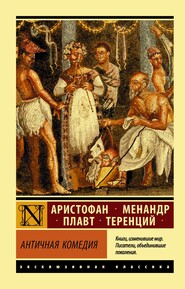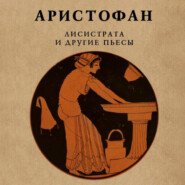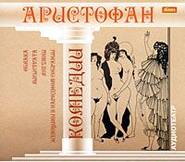По всем вопросам обращайтесь на: info@litportal.ru
(©) 2003-2024.
✖
The Eleven Comedies, Volume 1
Автор
Год написания книги
2018
Настройки чтения
Размер шрифта
Высота строк
Поля
SLAVE. But here they are back again! Will you begone, you loafing scoundrels.
MARKET-LOUNGER. Ah ha! here's the company coming out already.
A LACONIAN. My dear, sweet friend, come, take your flute in hand; I would fain dance and sing my best in honour of the Athenians and our noble selves.
AN ATHENIAN. Yes, take your flute, i' the gods' name. What a delight to see him dance!
CHORUS OF LACONIANS. Oh Mnemosyné! inspire these men, inspire my muse who knows our exploits and those of the Athenians. With what a godlike ardour did they swoop down at Artemisium[469 - Here, off the north coast of Euboea, the Greeks defeated the Persians in a naval battle, 480 B.C.] on the ships of the Medes! What a glorious victory was that! For the soldiers of Leonidas,[470 - The hero of Thermopylae, where the 300 Athenians arrested the advance of the invading hosts of Xerxes in the same year.] they were like fierce wild-boars whetting their tushes. The sweat ran down their faces, and drenched all their limbs, for verily the Persians were as many as the sands of the seashore. Oh! Artemis, huntress queen, whose arrows pierce the denizens of the woods, virgin goddess, be thou favourable to the Peace we here conclude; through thee may our hearts be long united! May this treaty draw close for ever the bonds of a happy friendship! No more wiles and stratagems! Aid us, oh! aid us, maiden huntress!
LYSISTRATA. All is for the best; and now, Laconians, take your wives away home with you, and you, Athenians, yours. May husband live happily with wife, and wife with husband. Dance, dance, to celebrate our bliss, and let us be heedful to avoid like mistakes for the future.
CHORUS OF ATHENIANS Appear, appear, dancers, and the Graces with you! Let us invoke, one and all, Artemis, and her heavenly brother, gracious Apollo, patron of the dance, and Dionysus, whose eye darts flame, as he steps forward surrounded by the Maenad maids, and Zeus, who wields the flashing lightning, and his august, thrice-blessed spouse, the Queen of Heaven! These let us invoke, and all the other gods, calling all the inhabitants of the skies to witness the noble Peace now concluded under the fond auspices of Aphrodité. Io Paean! Io Paean! dance, leap, as in honour of a victory won. Evoé! Evoé! And you, our Laconian guests, sing us a new and inspiring strain!
CHORUS OF LACONIANS. Leave once more, oh! leave once more the noble height of Taygetus, oh! Muse of Lacedaemon, and join us in singing the praises of Apollo of Amyclae, and Athena of the Brazen House, and the gallant twin sons of Tyndarus, who practise arms on the banks of Eurotas river.[471 - Amyclae, an ancient town on the Eurotas within two or three miles of Sparta, the traditional birthplace of Castor and Pollux; here stood a famous and magnificent Temple of Apollo."Of the Brazen House," a surname of Athené, from the Temple dedicated to her worship at Chalcis in Euboea, the walls of which were covered with plates of brass.Sons of Tyndarus, that is, Castor and Pollux, "the great twin brethren," held in peculiar reverence at Sparta.] Haste, haste hither with nimble-footed pace, let us sing Sparta, the city that delights in choruses divinely sweet and graceful dances, when our maidens bound lightly by the river side, like frolicsome fillies, beating the ground with rapid steps and shaking their long locks in the wind, as Bacchantes wave their wands in the wild revels of the Wine-god. At their head, oh! chaste and beauteous goddess, daughter of Latona, Artemis, do thou lead the song and dance. A fillet binding thy waving tresses, appear in thy loveliness; leap like a fawn; strike thy divine hands together to animate the dance, and aid us to renown the valiant goddess of battles, great Athené of the Brazen House!
* * * * *
FINIS OF "LYSISTRATA"
* * * * *
THE CLOUDS
INTRODUCTION
The satire in this, one of the best known of all Aristophanes' comedies, is directed against the new schools of philosophy, or perhaps we should rather say dialectic, which had lately been introduced, mostly from abroad, at Athens. The doctrines held up to ridicule are those of the 'Sophists'—such men as Thrasymachus from Chalcedon in Bithynia, Gorgias from Leontini in Sicily, Protagoras from Abdera in Thrace, and other foreign scholars and rhetoricians who had flocked to Athens as the intellectual centre of the Hellenic world. Strange to say, Socrates of all people, the avowed enemy and merciless critic of these men and their methods, is taken as their representative, and personally attacked with pitiless raillery. Presumably this was merely because he was the most prominent and noteworthy teacher and thinker of the day, while his grotesque personal appearance and startling eccentricities of behaviour gave a ready handle to caricature. Neither the author nor his audience took the trouble, or were likely to take the trouble, to discriminate nicely; there was, of course, a general resemblance between the Socratic 'elenchos' and the methods of the new practitioners of dialectic; and this was enough for stage purposes. However unjustly, Socrates is taken as typical of the newfangled sophistical teachers, just as in 'The Acharnians' Lamachus, with his Gorgon shield, is introduced as representative of the War party, though that general was not specially responsible for the continuance of hostilities more than anybody else.
Aristophanes' point of view, as a member of the aristocratical party and a fine old Conservative, is that these Sophists, as the professors of the new education had come to be called, and Socrates as their protagonist, were insincere and dangerous innovators, corrupting morals, persuading young men to despise the old-fashioned, home-grown virtues of the State and teaching a system of false and pernicious tricks of verbal fence whereby anything whatever could be proved, and the worse be made to seem the better—provided always sufficient payment were forthcoming. True, Socrates refused to take money from his pupils, and made it his chief reproach against the lecturing Sophists that they received fees; but what of that? The Comedian cannot pay heed to such fine distinctions, but belabours the whole tribe with indiscriminate raillery and scurrility.
The play was produced at the Great Dionysia in 423 B.C., but proved unsuccessful, Cratinus and Amipsias being awarded first and second prize. This is said to have been due to the intrigues and influence of Alcibiades, who resented the caricature of himself presented in the sporting Phidippides. A second edition of the drama was apparently produced some years later, to which the 'Parabasis' of the play as we possess it must belong, as it refers to events subsequent to the date named.
The plot is briefly as follows: Strepsiades, a wealthy country gentleman, has been brought to penury and deeply involved in debt by the extravagance and horsy tastes of his son Phidippides. Having heard of the wonderful new art of argument, the royal road to success in litigation, discovered by the Sophists, he hopes that, if only he can enter the 'Phrontisterion,' or Thinking-Shop, of Socrates, he will learn how to turn the tables on his creditors and avoid paying the debts which are dragging him down. He joins the school accordingly, but is found too old and stupid to profit by the lessons. So his son Phidippides is substituted as a more promising pupil. The latter takes to the new learning like a duck to water, and soon shows what progress he has made by beating his father and demonstrating that he is justified by all laws, divine and human, in what he is doing. This opens the old man's eyes, who sets fire to the 'Phrontisterion,' and the play ends in a great conflagration of this home of humbug.
* * * * *
THE CLOUDS
DRAMATIS PERSONAE
STREPSIADES.
PHIDIPPIDES.
SERVANT OF STREPSIADES.
SOCRATES.
DISCIPLES OF SOCRATES.
JUST DISCOURSE.
UNJUST DISCOURSE.
PASIAS, a Money-lender.
PASIAS' WITNESS.
AMYNIAS, another Money-lender.
CHAEREPHON.
CHORUS OF CLOUDS.
SCENE: A sleeping-room in Strepsiades' house; then in front of Socrates' house.
* * * * *
THE CLOUDS
STREPSIADES.[472 - He is in one bed and his son is in another; slaves are sleeping near them. It is night-time.] Great gods! will these nights never end? will daylight never come? I heard the cock crow long ago and my slaves are snoring still! Ah! 'twas not so formerly. Curses on the War! has it not done me ills enough? Now I may not even chastise my own slaves.[473 - The punishment most frequently inflicted upon slaves in the towns was to send them into the country to work in the fields, but at the period when the 'Clouds' was presented, 424 B.C., the invasions of the Peloponnesians forbade the pursuit of agriculture. Moreover, there existed the fear, that if the slaves were punished too harshly, they might go over to the enemy.] Again there's this brave lad, who never wakes the whole long night, but, wrapped in his five coverlets, farts away to his heart's content. Come! let me nestle in well and snore too, if it be possible … oh! misery, 'tis vain to think of sleep with all these expenses, this stable, these debts, which are devouring me, thanks to this fine cavalier, who only knows how to look after his long locks, to show himself off in his chariot and to dream of horses! And I, I am nearly dead, when I see the moon bringing the third decade in her train[474 - Among the Greeks, each month was divided into three decades. The last of the month was called [Greek: en_e kai nea], the day of the old and the new or the day of the new moon, and on that day interest, which it was customary to pay monthly, became due.] and my liability falling due…. Slave! light the lamp and bring me my tablets. Who are all my creditors? Let me see and reckon up the interest. What is it I owe? … Twelve minae to Pasias…. What! twelve minae to Pasias? … Why did I borrow these? Ah! I know! 'Twas to buy that thoroughbred, which cost me so dear.[475 - Literally, the horse marked with the [Greek: koppa] ([Symbol: Letter 'koppa']), a letter of the older Greek alphabet, afterwards disused, which distinguished the thoroughbreds.] How I should have prized the stone that had blinded him!
PHIDIPPIDES (in his sleep). That's not fair, Philo! Drive your chariot straight,[476 - Phidippides dreams that he is driving in a chariot race, and that an opponent is trying to cut into his track.] I say.
STREPSIADES. 'Tis this that is destroying me. He raves about horses, even in his sleep.
PHIDIPPIDES (still sleeping). How many times round the track is the race for the chariots of war?[477 - There was a prize specially reserved for war-chariots in the games of the Athenian hippodrome; being heavier than the chariots generally used, they doubtless had to cover a lesser number of laps, which explains Phidippides' question.]
STREPSIADES. 'Tis your own father you are driving to death … to ruin. Come! what debt comes next, after that of Pasias? … Three minae to Amynias for a chariot and its two wheels.
PHIDIPPIDES (still asleep). Give the horse a good roll in the dust and lead him home.
STREPSIADES. Ah! wretched boy! 'tis my money that you are making roll. My creditors have distrained on my goods, and here are others again, who demand security for their interest.
PHIDIPPIDES (awaking). What is the matter with you, father, that you groan and turn about the whole night through?
STREPSIADES. I have a bum-bailiff in the bedclothes biting me.
PHIDIPPIDES. For pity's sake, let me have a little sleep.
STREPSIADES. Very well, sleep on! but remember that all these debts will fall back on your shoulders. Oh! curses on the go-between who made me marry your mother! I lived so happily in the country, a commonplace, everyday life, but a good and easy one—had not a trouble, not a care, was rich in bees, in sheep and in olives. Then forsooth I must marry the niece of Megacles, the son of Megacles; I belonged to the country, she was from the town; she was a haughty, extravagant woman, a true Coesyra.[478 - The wife of Alcmaeon, a descendant of Nestor, who, driven from Messenia by the Heraclidae, came to settle in Athens in the twelfth century, and was the ancestor of the great family of the Alcmaeonidae, Pericles and Alcibiades belonged to it.] On the nuptial day, when I lay beside her, I was reeking of the dregs of the wine-cup, of cheese and of wool; she was redolent with essences, saffron, tender kisses, the love of spending, of good cheer and of wanton delights. I will not say she did nothing; no, she worked hard … to ruin me, and pretending all the while merely to be showing her the cloak she had woven for me, I said, "Wife, you go too fast about your work, your threads are too closely woven and you use far too much wool."
A SLAVE. There is no more oil in the lamp.
STREPSIADES. Why then did you light such a guzzling lamp? Come here, I am going to beat you!
SLAVE. What for?
STREPSIADES. Because you have put in too thick a wick…. Later, when we had this boy, what was to be his name? 'Twas the cause of much quarrelling with my loving wife. She insisted on having some reference to a horse in his name, that he should be called Xanthippus, Charippus or Callippides.[479 - The Greek word for horse is [Greek: hippos].] I wanted to name him Phidonides after his grandfather.[480 - Derived from [Greek: pheidesthai], to save.] We disputed long, and finally agreed to style him Phidippides….[481 - The name Phidippides contains both words, [Greek: hippos], horse, and [Greek: pheidesthai], to save, and was therefore a compromise arrived at between the two parents.] She used to fondle and coax him, saying, "Oh! what a joy it will be to me when you have grown up, to see you, like my father, Megacles,[482 - The heads of the family of the Alcmaeonidae bore the name of Megacles from generation to generation.] clothed in purple and standing up straight in your chariot driving your steeds toward the town." And I would say to him, "When, like your father, you will go, dressed in a skin, to fetch back your goats from Phelleus."[483 - A mountain in Attica.] Alas! he never listened to me and his madness for horses has shattered my fortune. But by dint of thinking the livelong night, I have discovered a road to salvation, both miraculous and divine. If he will but follow it, I shall be out of my trouble! First, however, he must be awakened, but let it be done as gently as possible. How shall I manage it? Phidippides! my little Phidippides!











